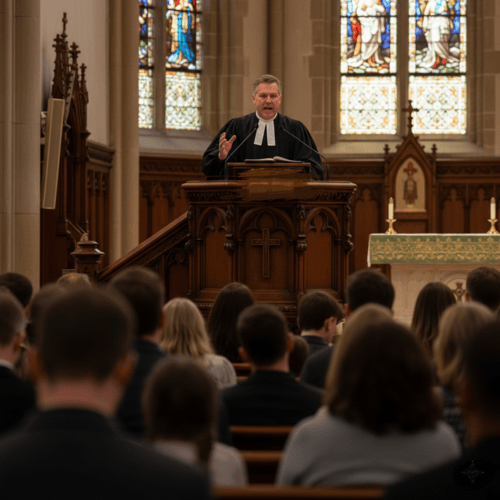If God Is Sovereign, Why Bother Praying?
DOESN’T DIVINE SOVEREIGNTY OBVIATE PRAYER?
**Editor’s Note: This post is part of our series, ‘Satan’s Lies: Common Deceptions in the Church Today’…
Li sat gazing out the hospital window, staring at nothing in particular. He’d been waiting for his wife’s shot of chemo to be over, so he could take her back to the ward. He’d hoped to pray for her as he sat there waiting, but a troubling thought had paralysed him: “If God’s truly sovereign and has already determined everything, what’s the point of praying?”
It’s a question that has shipwrecked the prayer lives of countless Christians. It presents a false dilemma: it pits God’s sovereignty against the necessity of prayer, suggesting one must diminish for the other to matter. But the question undermines both our understanding of God’s character and our need for prayer. The truth is far more beautiful and empowering than Satan’s lie would have us believe.
THE LIE EXPOSED: MISUNDERSTANDING SOVEREIGNTY
Satan’s lie treats God’s sovereignty like fatalistic determinism—as if God had simply wound up the universe like a clock and now watches it tick toward predetermined outcomes, making human actions irrelevant. The view reduces sovereignty to mere control over outcomes while ignoring the biblical reality that God ordains not just the ends, but also the means to those ends.
True sovereignty—as the Bible describes it—means that God, in His eternal wisdom, doesn’t just decree what will happen—He determines how it will happen. The Apostle Paul captures this perfectly: “Work out your salvation with fear and trembling, for it is God who works in you, both to will and to work for his good pleasure” (Philippians 2:12-13). God’s sovereignty doesn’t bypass our work; it includes and empowers it.
Think of a master composer who doesn’t just write the final, triumphant chord of a symphony. Every note, every rest, every crescendo is deliberately placed to create the intended masterpiece. Similarly, God’s sovereignty encompasses every prayer, every petition, every act of faith as part of His grand design.
BIBLICAL EVIDENCE: GOD COMMANDS WHAT HE COULD DO ALONE
Scripture repeatedly demonstrates God choosing to work through means He could certainly accomplish without us, including our prayer.
Prayer as God’s Appointed Means James confronts us directly: “You do not have because you do not ask” (James 4:2). If God’s sovereignty made prayer irrelevant, this verse would be meaningless. Instead, it reveals God has chosen prayer as the appointed channel for many of His blessings. When Jesus taught us to pray for daily bread (Matthew 6:11), He wasn’t suggesting God might forget to feed us, but establishing prayer as the means by which we acknowledge our dependence and receive His provision.
Paul’s instruction to pray “for all people, for kings and all who are in high positions” (1 Timothy 2:1-2) assumes our prayers genuinely impact earthly authorities and governance. These aren’t mere religious exercises—they’re appointed means of God’s rule.
Historical Demonstrations: Consider Hezekiah’s mortal illness. God, through Isaiah, declared the king would die (2 Kings 20:1). Yet when Hezekiah prayed earnestly, God added 15 years to his life (v. 6). Did God change His mind? No—God’s eternal plan included both the initial pronouncement and Hezekiah’s prayer as the means to a different outcome.
Abraham’s intercession for Sodom (Genesis 18:22-33) reveals God engaging genuinely with human petition. Each request met with divine consideration demonstrates prayer isn’t theatre—it’s real negotiation within God’s sovereign purposes.
When Israel worshipped the golden calf, God declared His intention to destroy them and start over with Moses (Exodus 32:9-10). Moses’ intercession turned away God’s wrath (v. 14). God’s sovereignty didn’t make Moses’ prayer pointless; it made it essential.
The Consistent Pattern: This pattern appears throughout Scripture. God saves souls through preaching (Romans 10:14-17), provides for families through work (2 Thessalonians 3:10), and accomplishes His will through prayer (Ezekiel 22:30). In each case, God could act directly but chooses to work through appointed means. This doesn’t limit His sovereignty—it demonstrates it.
UNDERSTANDING PRIMARY AND SECONDARY CAUSES
In Reformed theology, we distinguish between primary causation (God as ultimate source) and secondary causation (the means God employs). The Westminster Confession notes God’s eternal decree encompasses both the ends and the means in perfect harmony.
Prayer doesn’t change God’s mind—it’s the means by which God’s will is executed. When we pray for healing and recovery follows, both the prayer and the healing were part of God’s eternal plan. The prayer wasn’t unnecessary; it was indispensable.
Consider an earthly king who rules through appointed ambassadors. The king’s sovereignty isn’t threatened when ambassadors negotiate treaties—their authority flows from his. Similarly, our prayers derive their power not from our faith or eloquence, but from God’s sovereign appointment of prayer as His chosen means.
This maintains the beautiful mystery of divine sovereignty and human responsibility coexisting without contradiction. We cannot fully comprehend how both can be perfectly true, yet Scripture clearly teaches both.
WHY SATAN PROMOTES THIS LIE
The devil’s strategy becomes clear when we see the devastating effects of this deception:
- It Undermines Prayer Life: If prayer seems pointless, believers naturally stop praying, cutting themselves off from their primary means of spiritual communion and power.
- It Weakens Faith: Theological confusion about prayer creates spiritual paralysis, leaving believers uncertain about their role in God’s kingdom.
- It Distorts God’s Character: This lie makes God seem distant and mechanistic rather than the personal, relational God who desires our fellowship.
- It Breaks Divine Communion: Since prayer is fundamentally about relationship with God, the lie severs this vital connection.
- It Promotes Spiritual Fatalism: Instead of active, expectant faith, believers develop passive resignation that masquerades as humility but actually dishonors God.
Satan understands what many Christians forget: prayerless Christians are powerless Christians. By convincing us that sovereignty makes prayer meaningless, he effectively disarms the church.
HOW TO PRAY IN LIGHT OF GOD’S SOVEREIGNTY
Understanding God’s sovereignty should make us pray more boldly, not less. We can approach the throne of grace with confidence, knowing our prayers are part of God’s appointed means of accomplishing His will.
So we pray expectantly while submitting to God’s wisdom. We align our prayers with God’s revealed will in Scripture. We use prayer not merely to secure desired outcomes, but to grow in relationship with our heavenly Father. Remember, we pray not to inform God of things He doesn’t know, but to conform ourselves to His ways and participate in His work.
IF GOD IS SOVEREIGN, WHY BOTHER PRAYING? THE BEAUTY OF BOTH/AND
God’s sovereignty doesn’t eliminate prayer—it establishes prayer as His chosen means of relationship and kingdom work. The same God who ordains the harvest also ordains the planting, watering, and cultivation. The same God who determines outcomes also determines the prayers that help bring them about.
Don’t let Satan’s lie rob us of the privilege and power of prayer. Instead of praying less because God is sovereign, we pray more boldly because He has appointed prayer as His means of blessing His people and advancing His kingdom. Our prayers matter not in spite of God’s sovereignty, but precisely because of it.
IF GOD IS SOVEREIGN, WHY BOTHER PRAYING? RELATED FAQs
What did John Calvin specifically teach about prayer and God’s sovereignty? Calvin taught prayer is not meant to inform God of our needs (which He already knows perfectly) but to exercise our faith and prepare our hearts to receive God’s gifts with gratitude. In his Institutes, he argued God delays giving us certain blessings until we ask for them, not because He needs our permission, but because He wants us to recognise His hand in our provision. Calvin emphasised prayer is both a duty and a privilege—commanded by God precisely because He has ordained it as the means by which we participate in His sovereign work.
- How do we explain the mechanics of prayer within sovereignty? RC Sproul taught that God’s eternal decree includes the prayers of His people as part of the causal chain leading to His intended outcomes—prayer is “decreed” just as much as the answer to prayer. John Piper explains it through his concept of “Christian Hedonism”: we pray because God is most glorified when we are most satisfied in Him, and prayer is both the means and expression of finding our joy in God. Both scholars emphasise God ordains not only the ends but also the means, making prayer an essential link in God’s sovereign plan rather than an interruption to it.
- If God’s will always happens anyway, how do we explain seemingly unanswered prayers? Reformed theology distinguishes between God’s decretive will (what He has determined will happen) and His preceptive will (what He commands). When prayers seem “unanswered,” God’s decretive will is still perfectly accomplished—the “no” answer was itself part of His sovereign plan. Additionally, many prayers are answered in ways we don’t expect or recognise, and some prayers request things contrary to God’s revealed will in Scripture. The apparent lack of answer doesn’t indicate prayer’s ineffectiveness but rather demonstrates that God, in His wisdom, has better plans than we can imagine.
How does God use prayer to bring us to spiritual maturity, like Christ’s prayer “Yet not my will, but yours be done”? Prayer serves as God’s primary means of conforming us to the image of Christ, teaching us to align our desires with His will rather than demanding He align with ours. Through the discipline of prayer—especially when our requests seem unmet—God develops in us the same submissive trust that Christ demonstrated in Gethsemane. This process transforms prayer from a mechanism for getting what we want into a relationship where we learn to want what God wants. Mature prayer doesn’t seek to change God’s mind but allows God to change our hearts, producing the fruit of surrender, trust, and deeper communion with Him.
- What about intercessory prayer for others’ salvation—doesn’t their free will conflict with God’s sovereignty? Reformed theology holds that God sovereignly chooses whom He will save while simultaneously using intercessory prayer as one of His appointed means of bringing the elect to faith. Our prayers for unbelievers’ salvation don’t violate their will or override God’s election—they participate in God’s predetermined plan for how He will draw His chosen ones to Himself. Paul’s “heart’s desire and prayer” for Israel’s salvation (Romans 10:1) demonstrates that even apostles prayed for others’ conversion while believing in divine election. God often uses the prayers of faithful saints as the means by which He opens hearts and creates opportunities for Gospel witness.
- How do we address the biblical passages where God seems to “change His mind” in response to prayer? Reformed theologians interpret these anthropomorphic passages as God accommodating human language to describe divine actions from our temporal perspective. When Scripture says God “relented” or “changed His mind” (as with Moses’ intercession or Hezekiah’s prayer), it describes the outward appearance of God’s actions without contradicting His immutable nature. John Frame and other Reformed scholars explain God’s eternal plan included both the initial declaration and the subsequent prayer as means to the intended outcome. These passages demonstrate prayer’s real effectiveness within God’s unchanging purposes rather than suggesting actual divine mutability.
What’s the difference between “praying in God’s will” and fatalistic resignation to whatever happens? Praying “in God’s will” means aligning our prayers with God’s revealed character and promises in Scripture, praying with faith and expectation while submitting to His wisdom. This involves bold petition, persistent intercession, and confident expectation that God will act according to His good purposes. Fatalistic resignation, by contrast, assumes God will do whatever He wants regardless of our prayers, leading to passive spiritual lethargy. True submission to God’s sovereignty actually empowers more fervent prayer because we know our prayers matter to God and participate in His eternal purposes. We pray with both urgency and trust, knowing God delights to answer the prayers He Himself inspires.
IF GOD IS SOVEREIGN, WHY BOTHER PRAYING? OUR RELATED POSTS
Editor's Pick

Did Joseph Sin in Marrying an Egyptian?
It’s a troubling question: if God forbade His people from foreign alliances, why was Joseph’s marriage to an Egyptian not [...]

Jacob’s Ladder: How Jesus Bridges Earth and Heaven
THE GOSPEL IN GENESIS 28... A stairway to heaven—humanity has always dreamt of one since the Fall. Every religion offers [...]

In the World But Not Of It: What John 17:14-16 Really Means
Scrolling through social media, we’re bombarded by voices shouting for our allegiance—politics, trends, ideologies. As Christians, we feel the tension: [...]

Is Molinism Biblical? Reformed Challenges to Middle Knowledge
In a world craving autonomy, does God truly reign supreme, or does He negotiate with human choices? The question lies [...]

Does the Bible Teach Purgatory? Scripture’s Clear Answer
Imagine standing at the very edge of eternity, wondering if the soul requires further cleansing before you enter heaven's gates. [...]

David Danced Before the Lord—Why Don’t Reformed Churches?
When we read about King David leaping and dancing before the Lord “with all his might” (2 Samuel 6:14), a [...]

Faithful to the Pattern: Why Paul Reserves Ordination for Men
Few topics in contemporary Christianity generate more tension than women’s ordination. This question touches real lives, genuine callings, and deeply [...]

‘Flee Sexual Sin’: Why Does Paul Single This Sin Out?
When the apostle Paul writes to the Corinthian church, he doesn’t tell them to simply avoid sexual immorality or resist [...]

Does Denying God’s Sovereignty Mean Denying the Gospel?
RC Sproul once warned denying God’s sovereignty “eviscerates” grace—a strong word meaning to gut or disembowel something, leaving only an [...]

Why Christians Fast: The Biblical Discipline’s Very Real Rewards
Why would Christians, who rejoice in the good gifts of food and fellowship, deliberately choose to go without? Isn’t fasting [...]
SUPPORT US:
Feel the Holy Spirit's gentle nudge to partner with us?
Donate Online:
Account Name: TRUTHS TO DIE FOR FOUNDATION
Account Number: 10243565459
Bank IFSC: IDFB0043391
Bank Name: IDFC FIRST BANK






